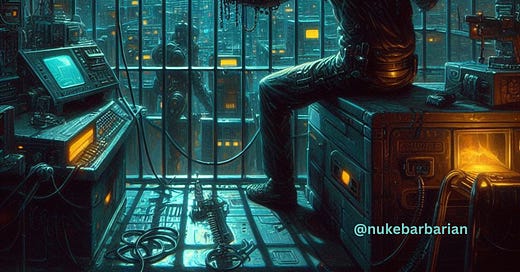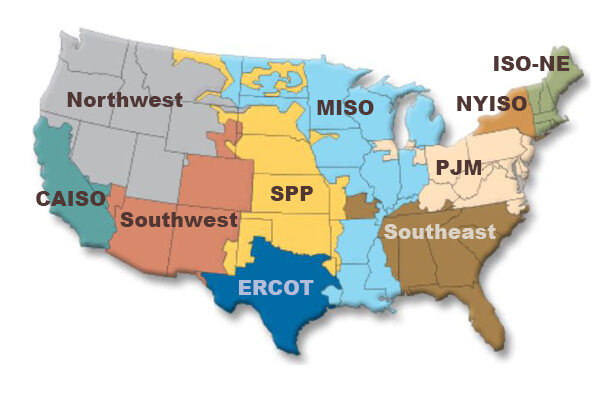Did An American Grid Operator Just Deny Climate Change?
Some notes on expertise, "neutral" management, and the public square
In the distance, alarm bells ring. Over the last few years, several of the bodies tasked with monitoring and regulating America’s power grid have warned that the country is hurdling toward a reliability crisis. The CEO of the Midcontinent Independent System Operator (see map below), John Bear, joined the swelling chorus of forewarners last week with MISO’s recent Reliability Imperative report.
“We have to face some hard realities,” Bear wrote. “Studies conducted by MISO and other entities indicate it is possible to reliably operate an electric system that has far fewer conventional power plants and far more zero-carbon resources than we have today. However, the transition that is underway to get to a decarbonized end state is posing material, adverse challenges to electric reliability.” [emphasis his] Bear’s words echo the North American Electric Reliability Corp.’s report from last year that cited the energy transition as the number one threat to reliability on the grid.
I’m not going to focus on the report’s specifics (I’ll be writing a deep dive into the report for premium Grid Brief subscribers on Friday). Instead, I want to juxtapose the MISO report with a recent publication from an alleged “disinformation” watchdog group, the Center for Countering Digital Hate.1 Last month, American actor and radical climatist Mark Ruffalo2 announced that CCDH had published a new report on what they call the “New Climate Denialism.”
In his announcement video, Ruffalo says that the oil companies are deploying a new tactic to “deny” the reality of climate change: criticizing renewables (and supporting nuclear energy). Here’s a handy infographic from page nine of the report that elucidates this:

I mentioned CCDH’s report because John Bear, the CEO of a major American grid operator, has committed “new climate denialism” according to the CCDH’s rubric. Now, CCDH is mainly concerned with getting YouTubers demonetized or otherwise flagged for not towing the party line on the “soft energy path” toward an all renewable future. They haven’t yet turned their baleful gaze toward MISO. Yet, we can envision a near-distant future wherein the John Bears of the world meet censure at the urging of groups like CCDH for reporting that the map does not resemble the territory; we’ve seen worse over less. This is an interesting development all on its own. But two other aspects leap out: the way science is used in politics; the rise of what
calls the “Humanitarian Party.”Let’s take these in order. No one doubts that science is the coin of the realm for Truth and even human meaning in contemporary society. This is an abuse of science’s purpose that comes with pernicious consequences. The attempt to grant science dominion beyond its fief has a particularly distortionary effect in politics, where many make sinister use of science’s reputation for neutral inquiry and its retinue of experts endowed with uncommon knowledge.
In a democracy, epistemic authority is shared amongst the people, which gives them recourse to the persuasive power of rhetoric; a vital share of the democratic enterprise belongs to discourse among the citizenry. Opinions are meant to compete for primacy within the political arena. Things don’t always work out, of course. Sometimes people—even the people—are misled and Truth buckles under the yoke of mere opinion. But a core tenet of democratic faith is that the people possess the ability to deploy reason and guide the polity either directly or through representatives or some combination of both. Hence the value of free speech to a democracy.
Invoking the authority of science is a way to perform an end-run around such a competition by borrowing science’s shine as the light of Truth. Thus, the “science” is trotted out as an authoritative, unambiguous, and somehow still neutral claim to the Truth (and therefore beyond mere opinion). To refute it—to subject it to democratic debate—would be to violate science’s “truthiness.” This is why CCDH feels comfortable calling criticism of the energy transition a species of “denialism”: democratic debate obtrudes on the Truth (as they see it) and so it must be quashed.
The free speech implications are obvious. SCOTUS is currently hearing cases on whether or not social media companies are “common carriers” or editorial entities. YouTube is part of the case under consideration and YouTube is the media now. Political creators on that platform receive more views than the entire roster of MSNBC. CCDH is smart for petitioning YouTube to flag videos from critics of the green ideology as deceptive because it allows them to have their cake and eat it too: it’s not an editorial decision, it’s not censorship, it’s just tweaking the content moderation policy. Expert-led and administrator executed.
Such a maneuver—removing policy questions from the realm of democratic debate and arrogating them to elite management—is the hallmark of the Humanitarian Party. Crawford describes the Humanitarian Party as “the diverse organs of a sprawling parastate that includes corporations, foundations, media, universities, and NGOs, and gathers these to a shared political vision” of identifying classes of people or things that require special protection and “adopts them as clients, and conspicuously puts these before us in idealized form.” To the environmentalists within the HP, “the planet” is one such client-victim.
Crawford continues: “Thus presented, recognition clients serve as mascots for various programs of social control that are powered by an ideal of compassion. However compassionate, such programs transfer power to a class of social managers and political rent-seekers.” The victims so identified must then be shielded from “harms” usually “perpetrated” by political antagonists (often the majority of society), an action that confers greater unaccountable power to the HP. CCDH is pursuing this exact course of action in order to purge the public square of those who would harm the planet by disagreeing with their climatist orthodoxy. CCDH aren’t the first to try this. President Biden’s first climate czar, the Natural Resources Defense Council’s Gina McCarthy, called for the same thing two years ago. Platforms like Facebook, Google, and YouTube have so far obliged.
But let’s take one step further. In a recent piece for Compact entitled “Why NGOs Run Your World,” Darel E. Paul cites alarming stats about this new “parastate.” For the last decade and a half, no other sector of the economy has grown like the NGO sector. “In the United States,” writes Paul, “they employ more people than the federal and state governments combined.” They’re tightly coupled with state regulators and policy makers.3 This is less true for CCDH (though it does have ties to Keir Starmer’s Labour Party in the UK) and more true for—you guessed it—MISO, which is a non-profit tasked with the neutral administration of its portion of the grid. MISO does not share the incentives, funding structure, or political radicalism of most NGOs, but its duties are public—though the discharge of those duties is immune to meaningful public accountability by definition. Many such cases.
One way to read the conflicting signals emanating from MISO and CCDH suggests itself: the state has become not an entity that expresses the will of the sovereign demos, but a mediating body for hypertrophied civil society organizations absent from democratic checks and balances. Thus, a major portion of the battle for control over our industrial commons resembles less a straightforward political struggle for democratic consensus and more a managerial showdown between different hemispheres of the non-profit sector.
Ruffalo was a vocal proponent for shutting down the Indian Point nuclear power plant, which had predictable effects on the power mix in the Empire State.
NGOs can also serve as a farm league for government bureaucracies. Consider that New York Governor Kathy Hochul just appointed a Natural Resources Defense Council alumna to the state’s Public Service Commission, which oversees the utility sector. The NRDC was instrumental in shutting down Indian Point and brokered the deal with California to close the Diablo Canyon nuclear power plant in California (though this plot has been waylaid by Governor Gavin Newsom for grid reliability reasons).







President Biden (or whomever controls his X account) wrote this today too:
“Anyone who willfully denies the impacts of climate change is condemning the American people to a dangerous future.”
So what’s his definition of denying “impacts of CC?” Does it mirror the Orwellian nonsense pushed by CCDH?
Well I guess the good news is that if this is how these folks want to define “Climate Change Denial” it will encompass like 85+% of people. So the words will no longer have any meaning. I stopped taking them seriously about 5 years ago, and the more shrill their criticism the more unhinged the NGO-Industrial complex will become, and the more support they will lose.